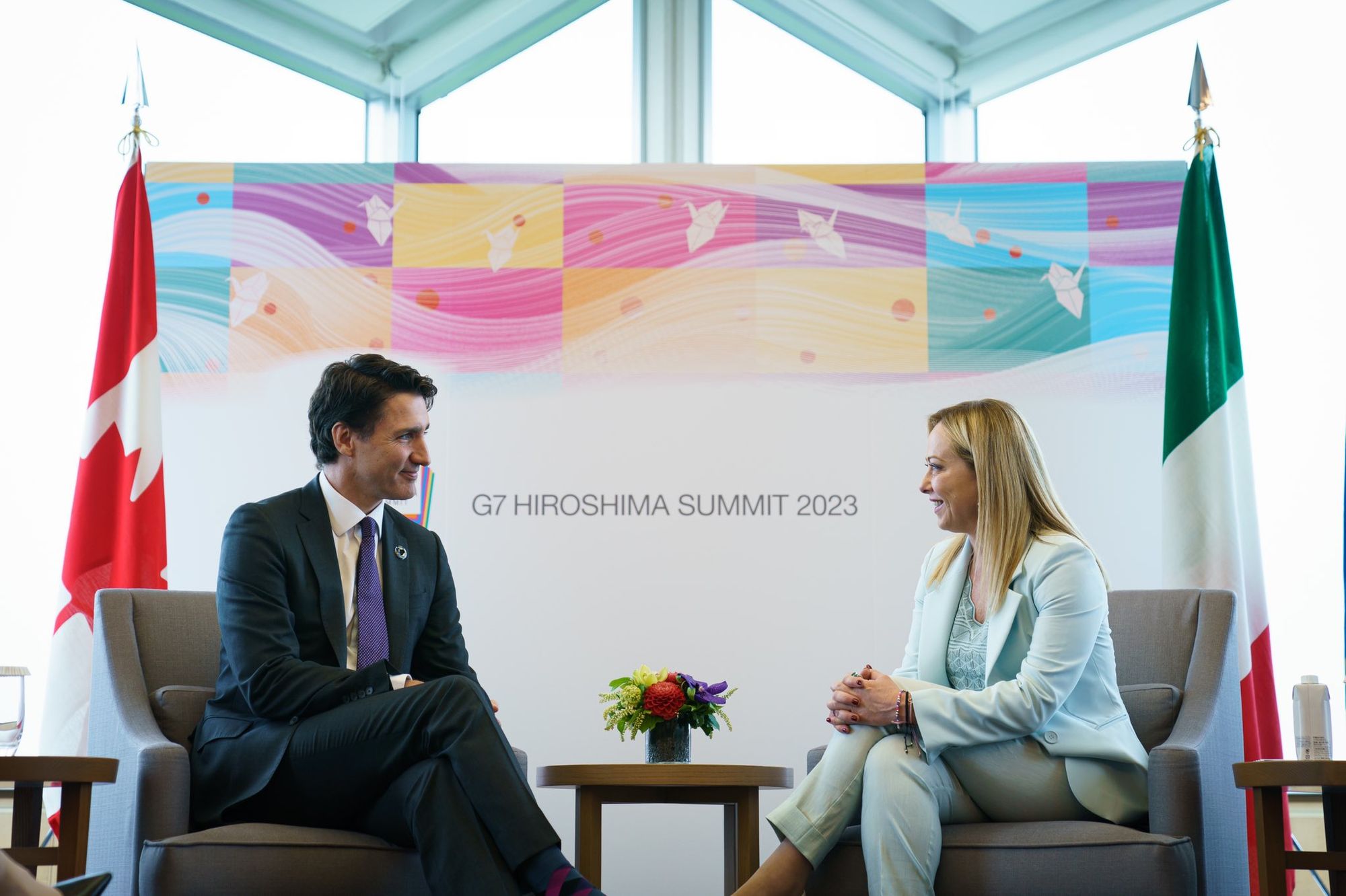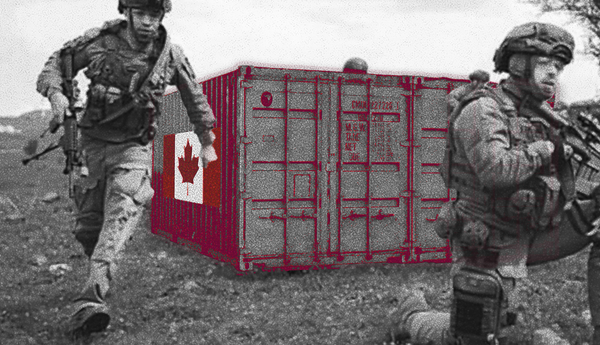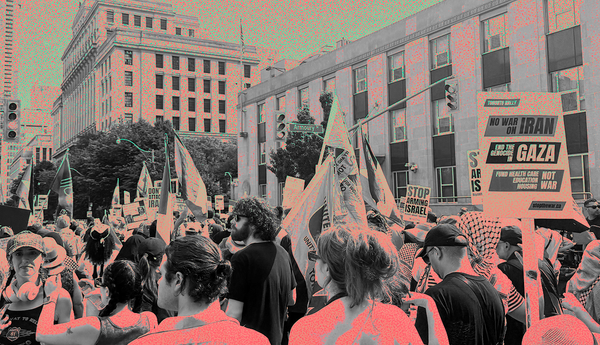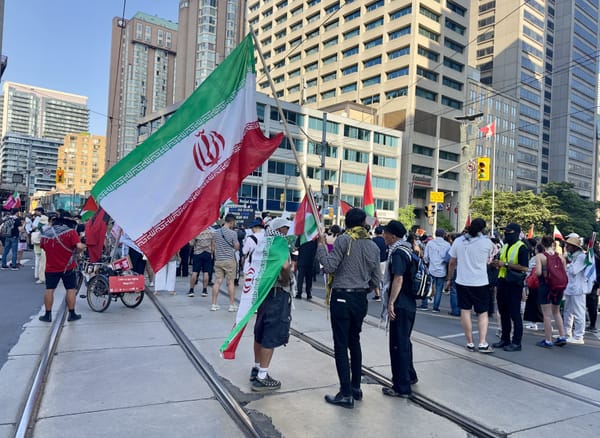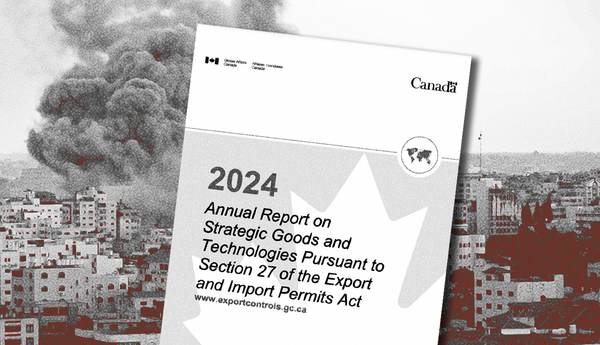Last Friday, Prime Minister Justin Trudeau set off a miniature storm when he expressed concern about Italian Prime Minister Giorgia Meloni’s cruel, anti-LGBTQ policies at the G7 summit in Hiroshima. The move earned Trudeau some approving headlines, and predictably prompted right-wing outlets to churn out their standard offerings of rage-bait.
Meloni and her far-right government, descended directly from Italian fascism, should be excoriated at every opportunity. But no one who cares about advancing LGBTQ rights and solidarity should fall for Trudeau’s piece of political pantomime. His words are not matched by the Liberal government’s actions or its own official statements about Meloni.
Trudeau’s mild-mannered criticism of Meloni came as the two leaders were about to enter a private meeting at the G7. Trudeau said, “Canada is concerned about some of the positions Italy is taking in terms of LGBT rights. But I look forward to talking with you about that.” Photos of the exchange appeared to show Meloni scowling with disapproval.
The positions Trudeau referred to include the Meloni government’s introduction of a bill that criminalizes people travelling abroad to have a baby via a surrogate, and its demand that municipal authorities stop automatically recognizing parental rights for same-sex couples, a move that left hundreds of families confused and angry.
It should be noted that it’s not only anti-LGBTQ policies that Meloni has pursued. Her coalition government is also viciously anti-migrant, with one minister recently suggesting that Italians are having fewer children so that they can be substituted for immigrants.
In response to Trudeau’s comments, Meloni claimed the prime minister had fallen victim to “fake news.” In a non-bylined article, the Toronto Sun seized on the opportunity to report Italian news headlines that had called Trudeau a “buffoon,” and quoted a Sky News Australia host who had described him as “repugnant.”
The petty furor around this story from right-wing outlets delighted with any opportunity to attack two of their favourite targets — LGBTQ people and Trudeau — might lead one to believe that Trudeau’s words amounted to a substantial clash with the Meloni administration. But the PMO’s official statement about the meeting downplayed the disagreement.
In fact, the statement heavily emphasized the two governments’ areas of “shared priorities,” in particular Meloni’s support for NATO’s objectives in Ukraine. The PMO also celebrated plans to “strengthen opportunities to work together, including via new trade, investment, and innovation partnerships” and “underscored the value of the Canada-European Union Comprehensive Economic and Trade Agreement (CETA).”
Buried deep down in the list of topics that were discussed, the PMO noted that, “The leaders also exchanged views on the importance of protecting and defending human rights, including the rights of 2SLGBTQI+ people. Prime Minister Meloni responded that her government is following court decisions and is not deviating from previous administrations.”
Italian governments famously don’t last very long, and it could be argued that there are longer-term bilateral objectives that Canada is more interested in focusing on with Italy. But we know from this statement and others like it that the Trudeau government values maintaining the status quo on military and geopolitical alliances more than it cares about pushing for the very values of human rights and democracy that those alliances, we’re constantly told, are ostensibly supposed to protect.
As The Maple revealed earlier this year, Global Affairs Canada internally monitored far-right celebrations and concerned reactions to Meloni’s election victory last fall, but was ultimately reassured by the fact that the post-fascist leader had made explicit promises to “EU and transatlantic partners that they can expect stability from a Meloni government.”
Despite Meloni’s well known links to Italian fascism and her record of anti-LGBTQ and anti-migrant views, Trudeau warmly congratulated her on her election victory, highlighting the fact that she became “Italy’s first woman Prime Minister” and emphasizing his hope to work with her on “trans-Atlantic security threats and challenges.”
We also know that despite the Trudeau government’s frequent lip service to LGBTQ rights and its “feminist foreign policy,” it continues to materially support other governments that have appalling track records on those issues. Despite slight murmurings of disapproval, Trudeau continues to lend diplomatic support and to allow arms trades with Israeli Prime Minister Benjamin Netanyahu’s far-right government in Israel, which includes a vicious, self-described “fascist homophobe” as finance minister.
The Trudeau government has also continued to allow the export of light-armoured vehicles to Saudi Arabia, whose murderous monarchy criminalizes LGBTQ people with penalties that can include lashes and imprisonment. Meanwhile, Trudeau’s global affairs ministry instructed International Development Minister Harjit Sajjan to lobby for a similar arms deal with Qatar, where same-sex relationships are punishable with up to seven years in jail. Sajjan’s briefing documents contained no mention of the country’s lack of LGBTQ rights, and he raised it with officials at the FIFA World Cup last year only after opposition leaders pressured him to do so.
So yes, calling out Meloni’s anti-LGBTQ agenda is a good thing, and leaders everywhere should do it at every opportunity. But please see Trudeau’s criticism of the Italian prime minister for what it is: an inconsequential stunt that distorts his ongoing support for reactionary governments in all parts of the world, and its prioritization of U.S.-led hegemony above everything else.


